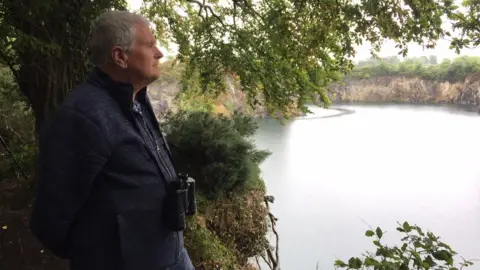Peregrine falcon chicks: 'Once in a lifetime' brood found in NI
A record has been set with the biggest brood of chicks raised in Northern Ireland by one of our most impressive birds of prey.
Five peregrine falcon chicks are currently fledging on the nest, perched high up on the steep walls of a rural quarry.
It is the first time such a number has been recorded at a single site.
It has been described as a "once in a lifetime event" which has never been seen before in Northern Ireland.
Peregrines are one of the world's fastest birds, reaching speeds of up to 200mph as they dive steeply on their prey, which mainly consists of feral pigeons and collared doves.
The chicks were discovered by friends Lindsay Hodges and Christine Cassidy, who are members of the NI Raptor Study Group.
They said it was an "incredibly exciting" moment when they realised they had five young at what has been a productive nest site in recent years.
"I was doing some filming when the fifth head popped up. It was wonderful and the parents have done such an exceptional job to raise five," Ms Hodges said.
Unionist assembly member Jim Wells has been surveying peregrine falcon nest sites for decades.
He said he has never seen as big a brood in all those years.
"I suspect I'll never see the like again," he added.

He put it down to a lack of disturbance due to the Covid-19 lockdown and excellent spring weather, which gave the chicks the best possible chance to thrive.
There are about 90 pairs of peregrine in Northern Ireland, many in quarries where they nest on the steep walls.
There are a few persecution hotspots, but generally the birds are actively looked after by people who know where they are, including quarry owners.
"A lot of them don't make it naturally because of cold winters or poor feeding...but overall it's a stable population that is doing well and this year because of the lockdown and the good weather it has been a particularly good season," Mr Wells said.
He expects only a couple of the chicks to make it through to full adulthood when they will return to the area to raise their own young.
 NI Raptor Study Group
NI Raptor Study GroupMr Wells said the discovery was the equivalent of a 147 break in snooker or a nine-dart finish.
The location is being kept secret to protect the nest and prevent disturbance.
The BBC and the NI Raptor Study Group have permission under a licence from the NI Environment Agency to record the birds.
